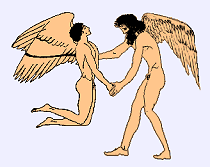|
绪论 - 什么是性行为? |
|
性行为当前的含义 4:
增进生存行为 |
 |
|
伊洛斯(爱神,左),正被赛纳托斯(死神,右)束缚着自由。
(自古希腊花瓶画)
Eros, the god of love (left),
being restrained by Thanatos,
the god of death (right).
(After ancient Greek vase paintings.)
|
|
|
术语“性行为(sexual
behavior)”可以是指所有“生存本能”的表现形式。
这是一个可以追溯到西格蒙德·弗洛伊德及其精神分析理论的、非常广义的定义。是弗洛伊德提出了“利比多(libido)”[1]的概念,是他首先把与人的性欲(sexual
urges)相关联的生理活力(physiological
energy)归纳为“利比多”;后来,他进而把人类所有秉持创造力所做出的努力也归因于“利比多”。最终,他把人的生命视为由两种对立的基本本能所统辖的有机体;这两种对立的基本本能被他按照古希腊神的名字命名:伊洛斯(Eros,爱神;生存本能)和赛纳托斯(Thanatos,死神;死亡本能)。这个观点并没有被他的所有后来者认可;不过,这种强烈的、天生的性本能(erotic
instinct)或性驱力(erotic
drive)的看法被广泛地接纳,甚至成为当代普遍流行的金科玉律。因而,在许多人的头脑里,“性驱力”开始代表着人类寻求所有快乐形式的动力。“性(sex)”是每一种增进生存行为(life-enhancing
behavior)的潜在动机。
|
|
Introduction - What is sexual behavior? |
|
Current Meanings of the Term 4: Life-enhancing Behavior |
|
|
|
The term "sexual behavior" can refer to all manifestations of the “life instinct”.
This is a very wide definition which can be traced to Sigmund Freud and his psychoanalytic theory. It was Freud who advanced the concept of "libido" (Latin: lust) which for him at first summarized the physiological energy associated with sexual urges, and later all constructive human endeavor. Eventually, he saw human life as a whole dominated by two opposing basic instincts which he named after two ancient Greek gods: Eros (the life instinct) and Thanatos (the death instinct). This view was not shared by all of his followers, but the notion of a powerful innate erotic instinct or drive was widely adopted and even became part of modern popular wisdom. Thus, in many minds "the sex drive" came to stand for man's pursuit of pleasure in all its forms. "Sex" was the underlying motive of every life-enhancing activity. |